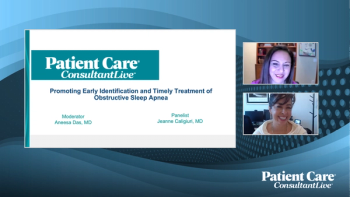
Shagun Bindlish, MD, board member of the American Diabetes Association, details available options for treating venous disease in patients with obesity.

Shagun Bindlish, MD, board member of the American Diabetes Association, details available options for treating venous disease in patients with obesity.

Guidance from the Advisory Committee on Immunization Practices on best practices for COVID-19 vaccination continues to evolve, Hopkins explained.

Agitation in Alzheimer disease is not limited to the later stages, geriatric psychiatrist George Grossberg, MD, explains; look for it across the spectrum.


Obesity medicine expert Caissa Troutman, MD, suggests using annual physicals as a "gateway" to identify patients with obesity with elevated blood pressure.

The geriatric psychiatrist refers in this interview to agitation in Alzheimer disease, a significant neuropsychiatric symptom that should not be dismissed.

Neurologist and clinical investigator Peter McAllister, MD, is eager to make progress in research on diagnosis and treatment and to hear more patient voices.

JoAnn Pinkerton, MD, national lead for the OASIS clinical trial program evaluating elinzanetant for menopausal VMS, discusses how non-hormonal therapy differs from HRT.

Caissa Troutman, MD, provides an overview of the connection between obesity and hypertension.

Panelists discuss how health care providers can identify patients at risk for obstructive sleep apnea through screening tools, clinical history assessment, and recognition of key symptoms such as daytime sleepiness, loud snoring, and witnessed breathing pauses during sleep.

Migraine expert Peter McAllister, MD, a long-time principal investigator for migraine studies, wonders if study design in this area needs to be re-evaluated.

Hopkins, of the National Foundation for Infectious Diseases, is frustrated by the diminished societal response to the virus' circulation including ongoing low vaccination rates.

Nondrug approaches to calming an adult with Alzheimer disease who is agitated should be prioritized over pharmacotherapy, geriatric psychiatrist George Grossberg, MD, counsels.

Caissa Troutman, MD, an obesity medicine and family medicine physician, emphasizes early treatment of obesity, along with HTN management, can improve patient outcomes.

Antipsychotic medications are still used to treat potentially harmful acute agitation, George Grossberg, MD, explains, even though the adverse effects are well known.

"This AHS statement has exceeded our wildest dreams..." McAllister said of the impact of the society recommendation that CGRP inhibitors be considered among first-line treatment for migraine.

Less than 15% of women in menopause receive treatment for VMS, suggesting a need a for more education and awareness, according to JoAnn Pinkerton, MD.

Significant strides were made in 2024 in evaluating a wide range of treatments for migraine, including phase 2 findings with PACAP inhibition, PI McAllister said.

The onset of migraine with its wide range of symptoms may be telegraphed as early as 2 days before by the frequency of neuronal oscillation deep in the brain.

Donna Ryan, MD, discusses the most significant clinical trials published this year in the field of obesity medicine.

Building trust with patients early on will help them feel comfortable discussing their symptoms and treatment preferences, says JoAnn Pinkerton, MD.

Robert Hopkins, Jr, MD, NFID medical director, details a range of resources on the foundation's website including in-depth vaccine recommendations, live webinars, plus much more.

Donna Ryan, MD, highlights exciting advancements in weight loss and metabolic treatments, particularly involving GLP-1 RAs and related therapies.

Under risk-based guidelines, less than 30% of eligible adults are vaccinated against pneumococcal disease, said Robert Hopkins, Jr, MD. More details, here.

Agitation affects at least one half of adults with Alzheimer disease; geriatric psychiatrist Grossberg explains the symptoms and new treatments in this year's video series.

President of the Obesity Medicine Association discusses a recent joint statement from the OMA and 4 other organizations calling for inclusion of patients with obesity in drug research.

Panelists discuss how untreated obstructive sleep apnea (OSA) significantly increases patients’ risk of serious health complications, including cardiovascular disease, type 2 diabetes, depression, and cognitive impairment while exacerbating existing comorbidities.

Geriatric psychiatrist and neurocognitive researcher George Grossberg, MD, highlights the mechanism of action for the new dextromethorphan/bupropion combination.

The future of obesity medicine is filled with promise as GLP-1 RAs and other peptides continue to demonstrate pluripotency in metabolic disease.

Angela Fitch, MD, discusses the importance of clinician education in addressing obesity with patients.